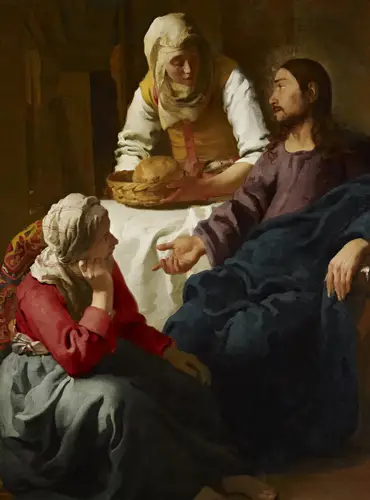Friday of the 24th week in Ordinary Time – Lk 8:1-3
In today’s brief Gospel, Luke recounts that Jesus went to preach the Good News throughout the region, going from town to town, village to village. In this, He is accompanied not only by the Twelve Apostles, but also by several women who had experienced Jesus’s healing power in some way: it might have been the expulsion of an evil spirit, or something more physical. The Greek word Luke uses for sickness, ἀσθένεια [as-then’-i-ah], is a broad term, and means literally a lack of strength, or an ailment that deprives someone of accomplishing what they would like to do. In this sense, then, all Christ’s disciples, ourselves included, must cooperate with Christ’s healing grace before we can follow Him.
There are two things that stick out about the women Luke describes: first, their diversity, but second, their unity. First, the list makes it clear how very different Christ’s disciples are. On one hand, we have “Mary, called Magdalene, from whom seven demons had gone out.” Whether that means Christ literally expelled seven demons from her, or, in a more spiritual sense, she had fallen into all seven capital vices, the point in the same: she was a woman who led a sinful life and came to live a life of penance. Some traditions hold that “Joanna, the wife of Herod’s steward Chuza,” was a widow, which would explain why her husband didn’t complain about her leaving home and traveling with Jesus, but, in any event, she was certainly a married woman at some point. Although Susanna doesn’t receive any qualification, her name means “Lily” in Hebrew, and so it might be thought she was a virgin. Thus, we have the three roads that lead back to God: penance, marriage, and virginity, and, as Fulton Sheen points out, all three will be represented at the foot of the Cross in Mary Magdalene, Mary the wife of Clopas, and the Blessed Virgin.
When we think of the 12 apostles and other disciples who were with them, with such figures as Matthew the Tax Collector and Simon the Zealot, we come to appreciate better the great diversity in Christ’s followers. Yet, despite their differences, all were united, our second point. Commenting on this, Pope Benedict XVI remarked that “the best thing is that in the group of Jesus’ followers, despite their differences, they all lived side by side, overcoming imaginable difficulties: indeed, what bound them together was Jesus Himself, in whom they all found themselves united with one another. This is clearly a lesson for us who are often inclined to accentuate differences and even contrasts, forgetting that in Jesus Christ we are given the strength to get the better of our continual conflicts.” This is particularly good lesson for us as religious, since we are called to live with others who are quite different from ourselves, and yet all are seeking perfection and seeking Christ.
Today, let us ask, through the intercession of Mary, Help of Christians, for the grace of unity and strength in our service of God and others.






